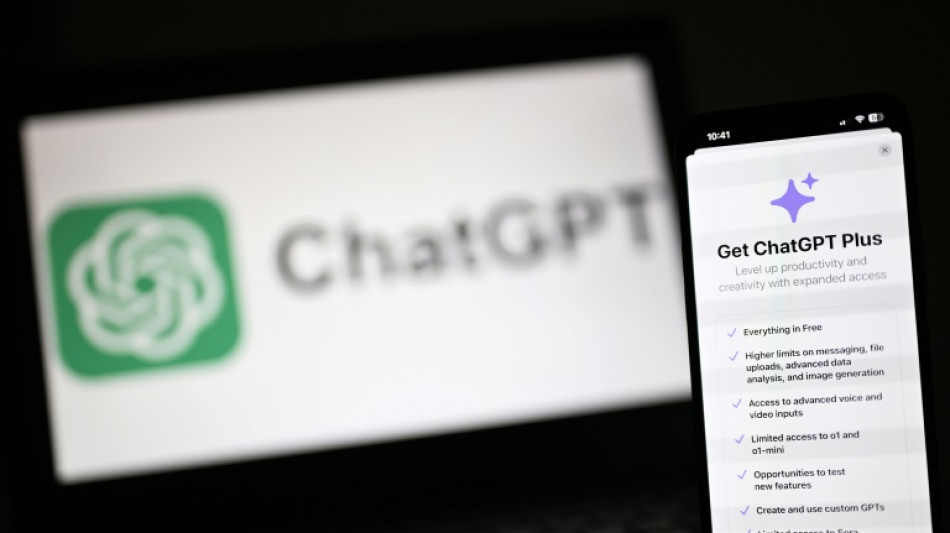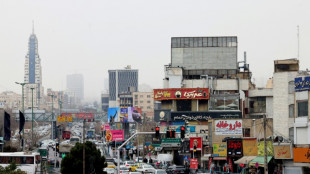
-
 Louvre heist probe: What we know
Louvre heist probe: What we know
-
Surging billionaire wealth a political threat, Oxfam warns as Davos opens

-
 Morocco fans stunned, disappointed as Senegal win Africa title
Morocco fans stunned, disappointed as Senegal win Africa title
-
Senegal fuelled by 'injustice' in AFCON final triumph, says hero Gueye

-
 Morocco coach Regragui laments 'shameful' scenes in AFCON final defeat
Morocco coach Regragui laments 'shameful' scenes in AFCON final defeat
-
Maye, Boutte wonder-catch carry Patriots past Texans

-
 Train collision in Spain kills 21, injures dozens
Train collision in Spain kills 21, injures dozens
-
Brazilians Abner, Endrick help Lyon climb to 4th in Ligue 1

-
 Barca beaten at Real Sociedad as Liga title race tightens
Barca beaten at Real Sociedad as Liga title race tightens
-
Socialist to face far-right candidate for Portugal's presidency

-
 Senegal stun hosts Morocco to win AFCON title after final walk-off protest
Senegal stun hosts Morocco to win AFCON title after final walk-off protest
-
Syria's leader agrees truce with Kurds after govt troops advance

-
 Morant shines as Grizzlies top Magic in London
Morant shines as Grizzlies top Magic in London
-
Real Sociedad end Barca winning streak to tighten Liga title race

-
 Senegal stun hosts Morocco to win AFCON title after ugly scenes mar final
Senegal stun hosts Morocco to win AFCON title after ugly scenes mar final
-
AC Milan in touch with Inter thanks to Fullkrug's first Serie A goal

-
 Lyon climb to fourth in Ligue 1 with victory over Brest
Lyon climb to fourth in Ligue 1 with victory over Brest
-
Morant shines as Grizzles top Magic in London

-
 Trump admin orders 1,500 troops to prepare for possible Minnesota deployment
Trump admin orders 1,500 troops to prepare for possible Minnesota deployment
-
Limited internet briefly returns in Iran after protest blackout

-
 South Africa declares national disaster as floods batter region
South Africa declares national disaster as floods batter region
-
Gang members in Guatemala kill seven police after prison crackdown: minister

-
 Villa's title bid rocked by Everton loss, Newcastle held at Wolves
Villa's title bid rocked by Everton loss, Newcastle held at Wolves
-
Dybala boosts Roma's Champions League hopes, Fiorentina honour Commisso

-
 Villa's title bid rocked by Everton loss, Newcastle held by Wolves
Villa's title bid rocked by Everton loss, Newcastle held by Wolves
-
'Avatar: Fire and Ash' at number one in N.America for fifth straight week

-
 Limited internet returns in Iran after protest blackout
Limited internet returns in Iran after protest blackout
-
Syria's leader agrees truce deal with Kurds after govt troops advance

-
 Smith's penalty sees Quins eliminate La Rochelle, Bordeaux secure top seeding
Smith's penalty sees Quins eliminate La Rochelle, Bordeaux secure top seeding
-
Atletico edge Alaves to strengthen Liga top-four hold

-
 Uganda president says opposition 'terrorists' in victory speech
Uganda president says opposition 'terrorists' in victory speech
-
New Zealand register first ODI series win in India despite Kohli ton

-
 Elvira wins Dubai Invitational after Lowry's last hole meltdown
Elvira wins Dubai Invitational after Lowry's last hole meltdown
-
Jeong snatches Union late draw at Stuttgart in Bundesliga

-
 Man Utd's Martinez hits back at Scholes after height jibes
Man Utd's Martinez hits back at Scholes after height jibes
-
Frank on the brink as Romero calls for unity amid Spurs 'disaster'

-
 Chile declares emergency as wildfires kill at least 15
Chile declares emergency as wildfires kill at least 15
-
Europe hits back at Trump tariff threat over Greenland

-
 Men's Fashion Week in Paris: what to watch
Men's Fashion Week in Paris: what to watch
-
McGrath goes top of slalom standings with Wengen win

-
 No Venus fairytale as Alcaraz, Sabalenka win Melbourne openers
No Venus fairytale as Alcaraz, Sabalenka win Melbourne openers
-
Iran considers 'gradually' restoring internet after shutdown

-
 Mitchell, Phillips tons guide New Zealand to 337-8 in ODI decider
Mitchell, Phillips tons guide New Zealand to 337-8 in ODI decider
-
Flailing Frankfurt sack coach Toppmoeller

-
 Kurdish forces withdraw from Syria's largest oil field as govt forces advance
Kurdish forces withdraw from Syria's largest oil field as govt forces advance
-
'Proud' Venus Williams, 45, exits Australian Open after epic battle

-
 Vonn in Olympic form with another World Cup podium in Tarvisio super-G
Vonn in Olympic form with another World Cup podium in Tarvisio super-G
-
Alcaraz kicks off career Grand Slam bid with tough Australian Open test

-
 Hosts Morocco face Mane's Senegal for AFCON glory
Hosts Morocco face Mane's Senegal for AFCON glory
-
Europe scrambles to respond to Trump tariff threat


Italian paper prints fully-AI edition, but not to 'kill' journalism
In a world first, an Italian newspaper is printing a fully AI-generated edition for a month in what its director said Thursday was an experiment to "revitalise journalism, not to kill it".
Il Foglio, a daily broadsheet with an irreverent touch and a circulation of about 29,000, says it is the first newspaper in the world to print entire editions created through artificial intelligence, a nascent technology that is rapidly changing how newsrooms operate.
It began on Tuesday producing a four-page daily AI edition in print and online, alongside its normal edition, featuring about 22 articles and three editorials.
Put simply, the newspaper's 20-odd journalists ask a version of OpenAI's ChatGPT chatbot to write a story on a specific subject in a specific tone, and it produces a text using information scraped off the internet.
Examples this week included an analysis of Prime Minister Giorgia Meloni's speeches, an editorial on the recent phone call between Donald Trump and Vladimir Putin -- and a fashion story.
Il Foglio's director, Claudio Cerasa, explained to AFP the idea behind the project and how it is going.
- What do you want to accomplish with this? -
"The purpose is twofold. On the one hand, to move theory into practice. On the other hand, it's to test ourselves and thus understand what the limits of AI are, but also the opportunities, the boundaries that must be overcome and those that cannot be.
"All this can spring from a special newspaper like ours, because ours is a newspaper that has irreverent, ironic, creative writing. We do things that are not easily reproducible with a machine.
"It was a desire to flaunt our being special and experiment with something that no one in the world has experimented with, in a disruptive way, creating debate, but above all, first attempting ourselves to understand how AI can be integrated with natural intelligence."
- How does the process work in practice? -
"In the editorial meeting, many topics come up. Some of these topics are then covered not only by the normal newspaper, but also by the artificial newspaper.
"Every question asked to AI contains a request for a theme... a request for a tone: respectful, irreverent, scandalous, provocative. In the end we ask it to have the style of the paper.
"If there are too many mistakes, we change articles (start a new one). If there are just few errors, though, we leave them, because we also want to understand what the limits are."
- What lessons have you learned from the first few days? -
"Artificial intelligence exceeds all expectations. We have learned it can do things that can compete with what a human does, but we have learned that in the long run competition must create greater efficiency.
"Innovation must be accepted, because you can't stop it, it must be understood, governed, and turned into an opportunity for growth.
"If one day there's a demand for articles made only with AI, it must be accepted. But that demand must increase journalists' creativity, because journalists will have to start getting used to not doing things that a machine could.
"So it's a way to revitalise journalism, not to kill it."
- Are journalists in the newsroom worried? -
"No, everyone is entertained, everyone is curious and among other things, it's interesting that with this experiment we're reaching a much larger audience. There are many people who, thanks to AI, are discovering the traditional paper. The first day we had a 60 percent rise in sales.
"It's no coincidence that no major newspaper has thought of (doing) it, because it is obviously scary. Only a newspaper like ours, which is somewhat unique, can afford to do an experiment like this."
He added: "The articles written by human beings are better, because they always have something more, they always have an element of creativity, of connection, of making unpredictable links that AI does not have."
- What are readers saying? -
"The readers are 90 percent entertained, 10 percent worried because they say 'Make sure you never leave your natural intelligence because you are better.' But there's no one who says the operation is stupid and senseless.
"Everyone has understood the spirit."
H.Weber--VB




